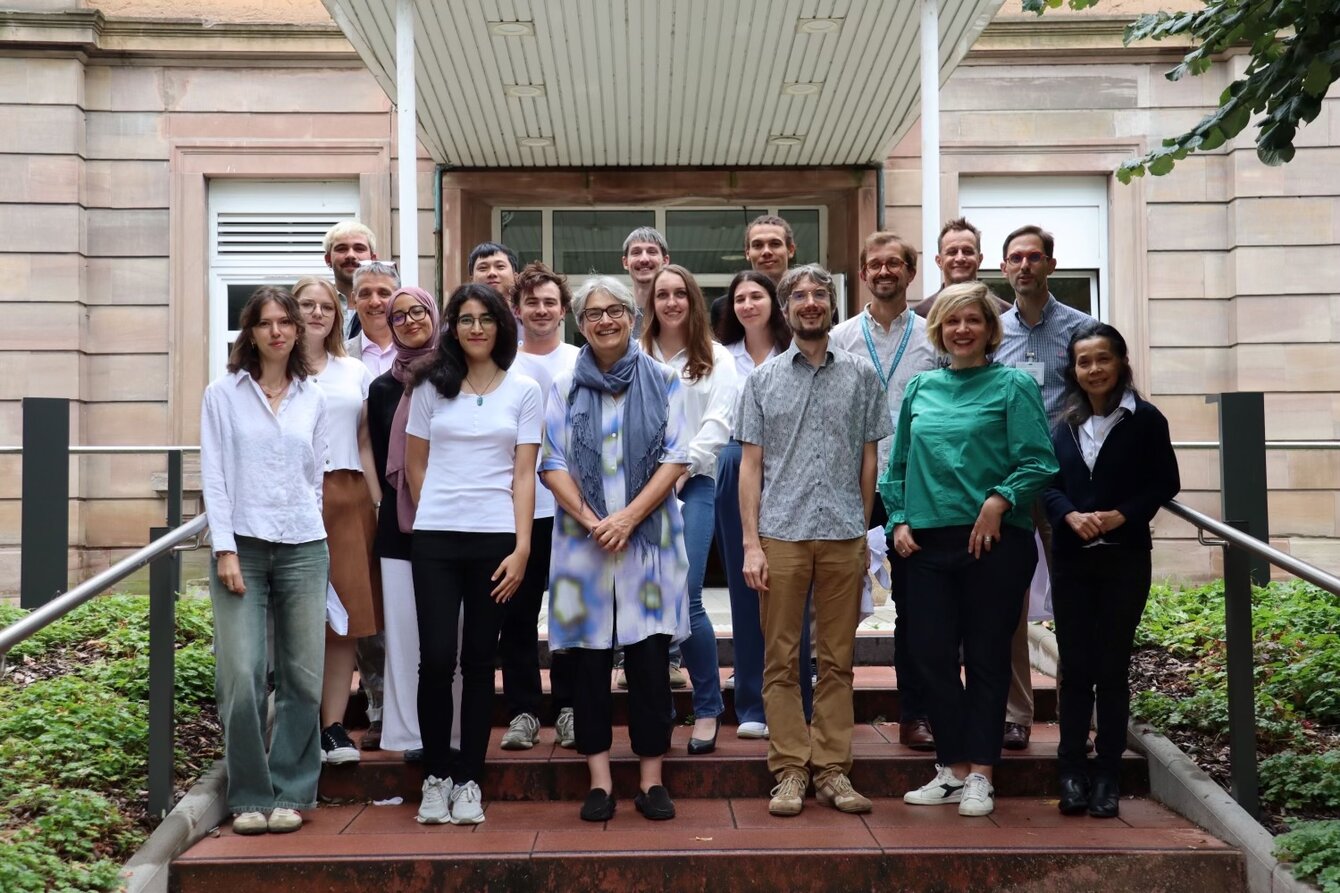Researchers
Anne Giersch
Patients describe strange perceptual experiences, such as a fragmentation of thought, reputedly linked to disorders of the sense of self. Trying to understand these experiences leads us to explore abstract questions such as the continuity of time. We intuitively think that we perceive the information around us as continuous, in the same way that physical time seems continuous. Yet a growing body of evidence suggests that we perceive time rhythmically. What is it that allows us, but not patients, to perceive time as continuous? We have demonstrated the existence of prediction mechanisms on the millisecond scale, which compensate for the constraints of our conscious perception and enable us to follow what is happening around us in a fluid manner. These mechanisms appear to be disrupted in schizophrenia. We are investigating whether these disorders pre-exist the development of psychosis, how they contribute to disorders of the sense of self, why these disorders are often transient, what causes them, and what the neurobiological basis of these disorders is.
Our expertise lies in the field of experimental psychology and psychophysics, but we are extending our methods to answer our questions: eye movement recording, electroencephalography, fMRI, virtual reality, motion capture and motor trajectory recording are all used in current projects.
Anne Bonnefond
My research is organised around two main themes: 1. the neurophysiological study of sustained attention, an impaired cognitive function in many clinical populations, and 2. the study of multidimensional apathy, a very common transnosographic clinical symptom. Our studies of healthy subjects and clinical populations - schizophrenia, attention deficit disorder with or without hyperactivity (ADHD) and depression - are based mainly on tools developed in experimental cognitive psychology and the electroencephalography (EEG) technique.
- Sustained attention is a basic form of attention which refers to our ability to maintain our cognitive activity effectively on a task for a relatively long period of time. Although it plays a decisive role in the proper functioning of a large number of perceptual and cognitive functions and, by extension, in all goal-directed behaviour, the cognitive and neuronal mechanisms underlying it are still poorly understood. To make progress in this area, AS deficits are explored along a continuum with, at one end, the state of inattention (a transient state of reduced attention), at the other end, inattentive symptomatology (a diagnostic criterion for ADHD) and, in between, the inattentive trait, i.e. a characteristic that is more stable than the state of inattention but without the disabling consequences associated with the symptom.
- Apathy is a clinical symptom defined as a quantitative reduction in goal-directed behaviour compared with the person's previous level of functioning. Despite the frequency of this symptom and its negative repercussions in all spheres of daily life, there is currently no effective treatment for it. To improve our understanding of the cognitive and neural mechanisms underlying apathy, our studies, conducted in healthy subjects with an apathetic trait as well as in patients suffering from schizophrenia or depressive disorders, are based on a multidimensional model of apathy that considers three distinct clinical sub-forms (i.e. emotional, executive, initiation).
Fabrice Berna
My main area of research concerns the study of autobiographical memory in schizophrenia, with the aim of gaining a better understanding of how disorders of this form of memory have an impact on certain symptoms such as personal identity (or self), delusions, hallucinations, etc. Our work also aims to develop innovative approaches to cognitive remediation of autobiographical memory, using portable cameras in particular. Our more recent work aims to gain a better understanding of the mechanisms common to alterations in episodic memory and autobiographical memory in schizophrenia by exploring different experimental materials, ranging from the most controlled (similar to episodic memory) to the most ecological (similar to autobiographical memory).
Gilles Bertschy
Throughout my career I have been interested in mood disorders and their treatment and more recently in their comorbidities such as ADHD. A generation of work on tachypsychia as a clinical marker contributing to the study of the distinction between bipolar and unipolar mood disorders is nearing completion. Our current involvement is focused on supporting the work of Sébastien Weibel.
Isabelle Offerlin-Meyer
I'm a clinical psychologist specialising in neuropsychology, with a doctorate in science. I work in the Psychiatry, Mental Health and Addiction Unit at Strasbourg University Hospitals (Professor Fabrice Berna's department), and in the Psychiatry team led by Dr Anne Giersch. My area of research :
- focuses on the development and implementation of individualised, integrative cognitive-functional interventions centred on specific activities/goals in daily life/professional life, aimed at people suffering from a mental disability,
- is part of a wider framework of psychosocial rehabilitation and recovery,
- is fuelling a paradigm shift from patient care to person-centred care, and
- promotes the notion of a life project rather than a care pathway.
Sébastien Weibel
My main area of research concerns attention deficit disorder with or without hyperactivity (ADHD) in adults and emotional regulation disorders, present in ADHD but also in other psychiatric disorders such as borderline personality disorder and bipolar disorder. Adult ADHD and emotional regulation difficulties are disorders that are still little recognised and little treated in France. What's more, these different disorders are often associated, making treatment more complex. My work as a researcher is linked to my work as a clinician. I'm looking to improve treatment and develop innovative therapeutic approaches. More specifically, my first line of research concerns the clinical characteristics and diagnostic limits of ADHD in adults, taking into account the complexity of co-morbidities (acceleration of thought, emotional dysregulation, borderline personality traits, temperament and sleep disorders). Secondly, I am interested in the cognitive mechanisms of attentional lapses in ADHD. We are seeking to characterise the neural mechanisms of these attention lapses, which are particularly frequent in ADHD, by comparing them with healthy controls and non-clinical participants with attention difficulties, and analysing the relationships between attention lapses and wandering thoughts. Thirdly, my projects are aimed at treating these patients. In collaboration with the Faculty of Psychology (Luisa Weiner), we are developing psychotherapeutic approaches using dialectical behaviour therapy, a therapy focusing on problems of emotional dysregulation, in patients with ADHD, borderline personality disorder, autism spectrum disorders and acquired brain injury. I am also interested in pharmacological approaches and particularly the cerebral effects of methylphenidate (the main treatment for ADHD) in people with ADHD associated with comorbidities.
Giulia Lafond-Brina
My research focuses on a better understanding of the transdiagnostic mechanisms of apathy, a clinical symptom defined as the reduction, or even absence, of the initiation of voluntary behaviour. Despite the frequency of this symptom in schizophrenia, bipolar disorders and resistant depression, and its negative impact on daily life, there is currently no effective treatment for it. To improve our understanding of the cognitive and neural mechanisms underlying apathy, our studies are based on a multidimensional model of apathy that considers three distinct clinical sub-forms (i.e. emotional, executive, initiation).
Our studies of healthy subjects with an isolated apathetic trait and of clinical populations - schizophrenia and unipolar and bipolar depressive disorders - are based mainly on tools developed in experimental cognitive psychology and the electroencephalography (EEG) technique.
The results of our work with Anne Bonnefond, mainly carried out as part of my neuroscience thesis, which was awarded the Prix Eurométropole de Strasbourg 2023 in 2024, a thesis prize awarded by the Société de Biologie de Strasbourg, now allow me to focus on two areas of research:
- Axis 1: Determine whether the three dimensions of multidimensional apathy could, rather than representing an early vulnerability factor for the onset of psychiatric pathology, enable more specific prediction of psychiatric pathology at risk.
- Axis 2: gain a better understanding of the mechanisms of apathy in schizophrenia, mood disorders and healthy subjects with an apathetic trait, in order to determine whether the management of this disabling symptom needs to be adapted according to the dimensions of apathy and/or the associated psychiatric pathology.

Michael Reber (PhD, HDR)
Multisensory detection and spatial localization – Developing visual rehabilitation tools in virtual reality.
Our research project builds on the laboratory’s fundamental knowledge of how the visual system operates (spatial localization) applied to the study of normal and pathological audiovisual detection and localization in humans. We are developing (i) tools to analyze spatial audiovisual detection abilities and (ii) sensory stimulation programs delivered via virtual reality headsets. The main objective is to characterize the mechanisms of bimodal visual/auditory perception in specific patient populations (visually impaired, low vision, psychotic patients) and to develop audiovisual rehabilitation methods aimed at improving mobility and orientation.
Methods: Clinical Trials, Eye/Head tracking, EEG, Audio-visual performance analysis, Coding (C#, Python).
Collaborations:
- Pr. A Sauer/Dr. L Dormegny – Service d’ophtalmologie, Hôpitaux Universitaires de Strasbourg,
- Pr. N. Entz-Werlé – Service de neuro-oncologie pédiatrique, Hôpitaux Universitaires de Strasbourg.
- Pr. L. Calvel – Service de soins palliatifs, Hôpitaux Universitaires de Strasbourg.
- Dr. A. Bakk – Future Care lab – Moholy-Nagy University, Budapest, HU.
- Dr. L. Appel – Faculty of Health – York University, Toronto, CA.
- Drs. C. Tator/C. Tartaglia – Canadian Concussion Center, University Health Network, Toronto, CA.
- Dr. J. Campos – Toronto Rehabilitation Institute, University Health Network, Toronto, CA.
- Scientifique affilié – Donald K. Johnson Eye Institute, University Health Network, Toronto, CA.
PhD students

Chaoyang Peng
This doctoral project explores the link between disturbances in the perception of time and the sense of identity in schizophrenia. Patients have difficulty maintaining temporal continuity, probably due to impaired prediction mechanisms. Using EEG and virtual reality (VR) tasks, the project is studying the functioning of temporal prediction in patients and its role in self-perception. Preliminary results show that VR helps to restore time prediction. The project aims to develop a biomarker for these impairments and to test augmented reality goggles to improve time perception and self-awareness, offering potential prevention and therapy for schizophrenia.
Catherine Bastian
My thesis project aims to characterise the neural correlates of attentional lapses, moments when our attention disengages from an ongoing activity. While these lapses exist in the general population, they are particularly frequent in patients suffering from Attention Deficit Disorder with or without Hyperactivity (ADHD). The aim of this project is therefore to study the neuronal mechanisms involved in the occurrence of lapses, both in healthy subjects and in adult ADHD patients, using EEG. More specifically, one of the avenues being explored is the intrusion of delta waves, brain waves typically observed during sleep.
Pierre Orselli
TRACE project (Trauma, Self-concept and Evolution)
The majority of individuals (≃80%) experience traumatic events in their lives that can impact their personal identity. This project aims to (1) characterise the impact of trauma on autobiographical memory and future self-defining projections (PSDF) in 3 post-traumatic trajectories: resilience, post-traumatic stress disorder (PTSD) and complex PTSD (cPTSD), (2) explore the links between trauma narrative content, autobiographical memory, PSDF and post-traumatic symptomatology. Healthy trauma-exposed subjects and subjects with PTSD or cPTSD will participate in two visits including questionnaires and semi-directive tasks, separated by diary-keeping for patients. We predict that (1) the trauma will be more central to the identity of patients than resilient individuals, (2) the coherence of the trauma narrative will be associated with adaptive identity markers and less post-traumatic symptomatology. Ultimately, this project could help refine the diagnosis, identify therapeutic avenues and redefine current paradigms.
Gabriela Horáková
My thesis project aims to better characterize mind-wandering in patients with attention-deficit/hyperactivity disorder (ADHD). Although previous research suggests that the tendency to mind-wander—defined as a shift of attention from an external task to internally generated thoughts—is particularly pronounced in ADHD, these conclusions have mostly relied on self-reported questionnaires. Using a Go/No-Go task with embedded thought-probes to assess participants’ attentional state in real time, combined with electroencephalographic (EEG) recording, my goal is to examine the cognitive and neural mechanisms underlying mind-wandering. I am also interested in determining to what extent this phenomenon may underlie the performance impairments typically observed in ADHD. Building on the hypo-arousal and default mode network (DMN) interference theories of ADHD, this research ultimately aims to identify targeted intervention strategies to better regulate the mind-wandering frequency, in order to improve attentional functioning, and reduce its negative impact on performance and daily life in these patients.
Bénédicte Darbon
My thesis project aims to understand the mechanisms behind visual rehabilitation in people with hemianopia. This loss of vision in half of the visual field, which can be caused by a tumor (11% of cases), can significantly impact daily life. A training program based on moving audiovisual stimuli has been implemented in virtual reality by members of the team. A pilot study (10 patients) has already shown that it can restore perception in the blind field after six weeks. The team is now embarking on a larger study (100 patients) to validate the effectiveness of this program over 8 weeks. Using data on eye and head movements, visual cortex (V1) activity, and sound localization abilities, my goal is to understand the visuospatial detection strategies implemented and the physiological effects explaining rehabilitation. Audiovisual stimulation could play a key role by recruiting multisensory structures such as the superior colliculus to bypass V1 in information processing.
Telma Nette
My thesis project focuses on temporal prediction mechanisms, which enable us to anticipate the occurrence of an event and adjust our behavior accordingly.
In people with schizophrenia, these temporal prediction mechanisms are impaired, particularly at the millisecond level. Their perception of time is therefore discontinuous. Some studies show that this alteration is linked to minimal self-disorder, a disorder that describes an alteration in the fundamental sense of being a unified being, continuous in time and at the origin of one's experiences. Indeed, if time is experienced as fragmented, it is difficult to perceive oneself as a unified and continuous being in time.
This project aims to explore a therapeutic approach to reducing this disorder by acting on the ability to predict time. In particular, we are studying the impact of transcranial magnetic stimulation (TMS) applied to the cerebellum, targeted in particular because of its integration within the cerebellar-thalamo-cortical network, which is involved in making and adjusting predictions. The thesis first evaluates, in healthy volunteers, whether cerebellar stimulation can modulate temporal prediction ability by comparing electroencephalographic (EEG) and behavioral measures collected before and after TMS stimulation.

